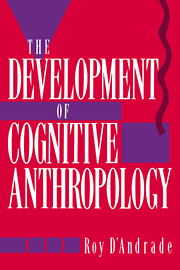Book contents
- Frontmatter
- Contents
- List of figures
- List of tables
- Preface
- 1 Background
- 2 Towards an analysis of meaning
- 3 The classic feature model
- 4 Extension of the feature model
- 5 Folk taxonomies
- 6 The growth of schema theory
- 7 Models and theories
- 8 Cultural representations and psychological processes
- 9 Cognitive processes and personality
- 10 Summing up
- References
- Name index
- General index
8 - Cultural representations and psychological processes
Published online by Cambridge University Press: 05 June 2012
- Frontmatter
- Contents
- List of figures
- List of tables
- Preface
- 1 Background
- 2 Towards an analysis of meaning
- 3 The classic feature model
- 4 Extension of the feature model
- 5 Folk taxonomies
- 6 The growth of schema theory
- 7 Models and theories
- 8 Cultural representations and psychological processes
- 9 Cognitive processes and personality
- 10 Summing up
- References
- Name index
- General index
Summary
Cognitive representations – properties, prototypes, schemas, models, theories – make up the stuff of culture in the mind. These representations are adaptive in simply being representations; that is, in providing maps of the world. Such a function is not trivial, since effective action requires an understanding of how the world is organized. But cultural representations do more than provide maps. This chapter will consider evidence that under certain conditions cultural representations have significant effects on perception, memory, and reasoning. The argument here is not that of extreme cultural constructionism, which argues that everything is determined by culture, nor that of psychological reductionism, which argues that all culture is determined by the nature of the human psyche. The position taken here is that of interactionism, which hypothesizes that culture and psychology mutually affect each other. The problem, as Richard Shweder (1993:500) says, is to determine “how culture and psyche make each other up.”
Perception
One of the earliest hypotheses about the cognitive effects of cultural representations was the hypothesis that cultural categories influence how people think. If this is true, then natural language, as the great matrix of cultural categories, should be an important determinant of thought. In the anthropological literature this has been called the Sapir–Whorf hypothesis, named after Edward Sapir, a famous anthropological linguist who did pioneering work on American Indian languages in the 1920s, and Benjamin Whorf, a linguist and autodidact who wrote about the the effects of language on thought in the 1940s.
- Type
- Chapter
- Information
- The Development of Cognitive Anthropology , pp. 182 - 217Publisher: Cambridge University PressPrint publication year: 1995
- 1
- Cited by



